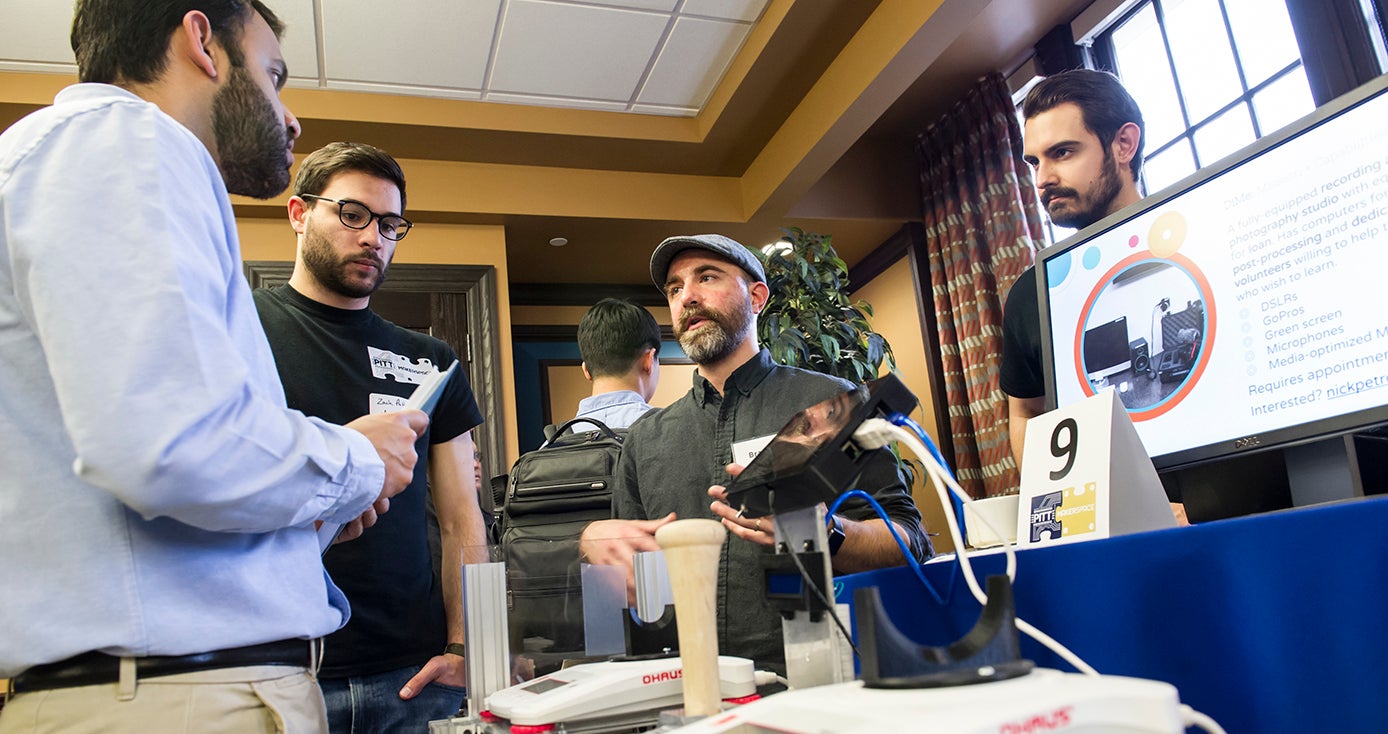
Subscribe to Pittwire Today
Get the most interesting and important stories from the University of Pittsburgh.Researchers 'Speed Date' in Search of Expert Help to Take Ideas From Concept to Market
Starting a conversation on a blind date can be an intimidating task, and the same might be said for researchers trying to find just the right match to help commercialize their projects.
With this in mind, the inaugural Found in Translation speed networking event held in February took its inspiration from speed dating — where people looking for dates have short conversations with each other in search of mutual interest.
“I haven’t seen anything like this where you can talk to over 30 commercial translation experts in three hours anywhere else,” said Blake Dube, a 2017 chemical engineering graduate from the University of Pittsburgh’s Swanson School of Engineering, who aims to commercialize a portable oxygen supply concept. “Events like these really help. There are a lot of great minds in one place.”
What is sciVelo?
sciVelo is the University of Pittsburgh’s strategic starting point for basic scientific and translational research projects, like those funded by the Pitt Innovation Challenge.
Students, staff and faculty from any discipline can use sciVelo’s commercial translation know-how and pool of scientists, clinicians and business experts to extend the impact of their research and tackle health care’s biggest problems.
sciVelo’s collaboration with the Clinical and Translational Science Institute, in addition to sciVelo’s partnerships with the Innovation Institute and Office of Corporate Engagement, leverages regional and national resources to foster entrepreneurship, commercialization and strategic partnerships.
sciVelo’s commercial translators engage investigators at the start of the research process, helping with scientific strategy, funding, pitch presentation and developing multidisciplinary collaborations that maximize the marketable potential of a researcher’s idea.
The event was hosted by Pitt’s Clinical & Translational Science Institute and sciVelo. It introduced Dube and other winners of the institute’s Pitt Innovation Challenge (PInCh) to stakeholders inside and outside the University who have the expertise to take an idea from concept to reality.
One University stakeholder at the event was Pitt Makerspace, which is a series of sites across campus that provide students multidisciplinary environments to build, collaborate and create.
“Events like these are good for connecting budding companies with good resources,” said Zach Patterson, a Pitt Makerspace member who attended the event. “A lot of these investigators know they need engineering design work or tools and material, but don’t necessarily have the knowledge or expertise to make these things happen.”
Nearly two dozen PInCh-funded teams and 32 stakeholders were present at the event, participating in two rounds of speed networking. Each round comprised a series of five-minute “dates” where researchers pitched their projects to stakeholder representatives.
The project teams were paired with experts based upon project maturity level. For example, projects at the concept or prototyping phase were connected with experts to assist with early stage efforts. Projects at or near the company formation point connected more with accelerators and early stage investors.
“Each (research) team has a story,” said Don Taylor, assistant vice chancellor for commercial translation in the health sciences and executive director of sciVelo, Pitt’s commercial translation program born out of the Schools of the Health Sciences. “We want researchers to embrace their commercial translation story and expand the impact of their research as part of the Plan for Pitt.”
Dube’s story centered on his startup company, Aeronics, Inc., and the concept he hopes to market: a portable oxygen supply that fits in the palm of a hand.
Dube said the next step for Aeronics is preparing for its first product launch, and that making connections, like those at the speed networking event are “invaluable” to academic innovators and entrepreneurs.
With the success of the inaugural event, coordinators Mike Flock of the institute and Alyssa Lypson of sciVelo said they plan to put together another speed networking affair in the future.
And John Maier, PInCh program director, said his team is “trying to get faculty connected to this ecosystem and help them move to the next step in translating their research to impact. Events like this are a really exciting aspect of the innovation and translation environment here at Pitt and in Pittsburgh and we are proud to be part of it.”


